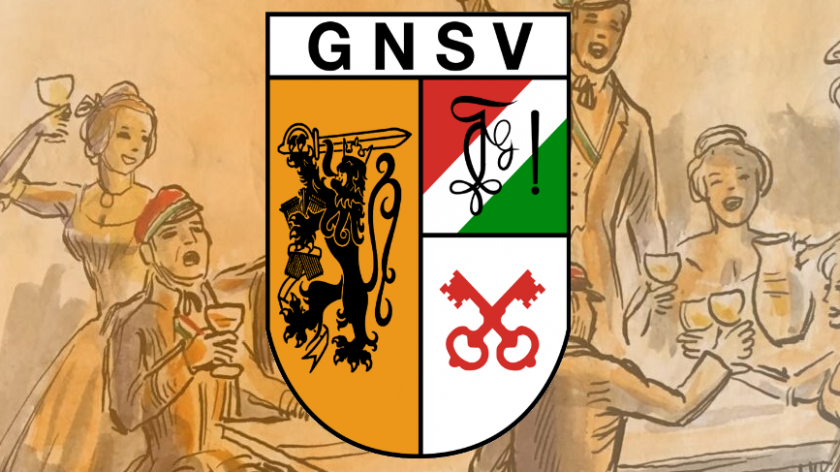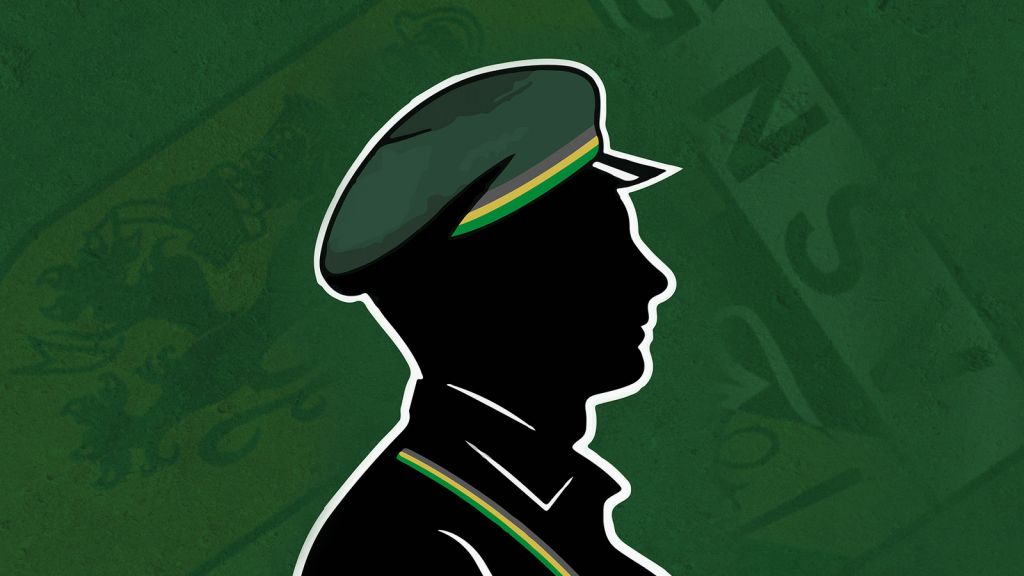How extreme is the GNSV? Seven questions about this new Nijmegen association
-
 Logo GNSV.
Logo GNSV.
The Groot-Nederlandse Studentenvereniging’s presence caused a row at the intro market last Monday. Where did the association come from, and what is its philosophy?
Radboud University’s intro market made national headlines after several members of the Groot-Nederlandse Studentenvereniging (GNSV) were injured in a fight. The action against GNSV was claimed by Action Group Nijmegen yesterday afternoon. Here are seven questions and answers concerning GNSV.
1. What kind of association is GNSV?
GNSV presents itself as a “traditional student association, based on the Flemish model” which utilises hazing. According to the association’s website, its members have a conservative-nationalist outlook. The association claims to be a political association for “right-wing students who take a critical view of society” and who “are fed up with left-wing curricula in the lecture halls.” GNSV is a proponent of the ‘Greater Netherlands’ ideology: the political union of Flanders with the Netherlands (see insert).
GNSV has been active in Leiden since 2021, where they have 20 members, according to the Leidsch Dagblad. GNSV hosted drinks in Leiden, with names such as ‘Leidens Ontzet’, ‘Goedheiligman Sinterklaas’, and ‘Boer Lives Matter’. That last name refers to the theory that there is a genocide in progress, targeting descendants of early Dutch colonists in South Africa; a theory for which there is no statistical evidence.
Nijmegen’s department of the association presently has three board members; the chair told Vox that many students are interested in joining.
2. Is GNSV extreme right-wing?
‘That is very difficult to say, because we don’t know a lot about the association yet’, according to Willemijn Kadijk, who studies extreme right-wing organisations in the Netherlands at the NTA, an independent research bureau that investigates polarisation, extremism, and radicalisation. ‘In order to be able to say that about an organisation, you need factual information regarding their stances. For instance, what are their views on subjects such as democracy, lgbtqia+, or people with a migration background. That’s where the line is between ‘conservative’ and ‘nationalist, extreme-right’.
‘However’, Kadijk continues, ‘at the very least, we can state that the association has a lot of extreme-right elements.’ According to Kadijk, this has to do with the subjects the club engages with, and the networks they’re a part of.

‘For instance, there is a GNSV interview in De Stormlamp, the magazine for the Geuzenbond; that doesn’t happen if your associations are unrelated. De Geuzenbond can be considered an extreme-right organisation, among other reasons, because they are an exponent of the Great Replacement theory.’ This theory posits that Europe’s western population is slowly being replaced by non-Western migrants. The National Coordinator for Security and Counterterrorism has issued a warning concerning the spread of this theory in society.
GNSV also has close ties to the Vlaamse Nationalistische Studentenvereniging (NSV!). The Flemish sister party gave their unconditional support to GNSV on X (formerly Twitter) after the campus row this past Monday. NSV! Is a breeding pool for politicians of the extreme right-wing party Vlaams Belang. Former members include Tom van Grieken and Filip Dewinter.
NSV! Is an extreme right-wing organisation, according to Kadijk. ‘You can tell by the speakers they host, which include the leading figures of extreme right-wing organisations in Europe. For example, they’ve hosted lectures with extreme right-wing philosophers like the Austrian Martin Sellner.
3. Why does the GNSV want to get in touch with Flanders?
According to an article in De Stormlamp, the magazine for the Geuzenbond, GNSV is looking for like-minded people in Flanders, because they aim for a “unification of all Dutch-language areas in Europe under a single nation-state.”
‘That ‘Greater Netherlands’ ideology has its origin in the Belgian Revolution of 1830’, according to historian Fons Meijer (see insert). The ideology became politically charged during World War I, when a group of activists wanted to fuse together Flanders and the Netherlands into a single nation. The ideology became controversial in the 1930s, because a group of ‘Greater Netherlands’ exponents developed increasingly national-socialist sympathies.
4. How important is the ‘Greater Netherlands’ ideology nowadays?
Political ideas concerning the ‘Greater Netherlands’ are still alive among extreme right-wing splinter factions. ‘It’s a recurring idea in extreme right-wing circles’, as stated by Kadijk. ‘It’s used as a kind of mythmaking, the idea that the Flemish and the Dutch are one people. Their perfect world involves a country with a homogenous population; others are not welcome.’
Every now and then, extreme right-wing politicians speak on the matter. Geert Wilders (PVV), as well as Thierry Baudet (FvD) and Dries van Langenhove (founder of the extreme right-wing youth organisation Schild & Vrienden, and formerly an independent politician in the Vlaams Belang fraction of the Belgian Chamber), have expressed themselves favourably regarding the ‘Greater Netherlands’ ideology.
5. How big can the GNSV get in Nijmegen?
Not very big, Roderik Rekker suspects, a political scientist at Radboud University. According to Rekker, research shows that most students have a rather progressive and cosmopolitan outlook. However, that doesn’t exclude the fact that a small minority of students doesn’t feel welcome at the university. ‘When they find each other in an association, they might feel a joy of recognition.’
Rekker continues: it is also known that students at a younger age feel more attracted to radical parties and organisations. ‘That can be both to the radical-left as well as to the radical-right.’
‘Are we making GNSV bigger than it is?’
Rekker does wonder whether we are giving GNSV too much attention. ‘Not only the media should ask itself this question. If it is true that people have attacked the GNSV at the intro market, then they have made them martyrs of free speech.’ In other words: it would have been better to have ignored the association.
6. Was it right to give the GNSV a spot at the Radboud intro market at all?
Political scientist Roderik Rekkers and historian Fons Meijer, who both work at Radboud University, prefer not to answer this question.
NTA researcher Willemijn Kadijk does want to say something about this. ‘We are not an opinion-forming agency’, she says, ‘but this can lead to the normalisation of radical right-wing ideas, as they are given a spot in a respectable, legitimate setting.’
7. Did the fight at the intro market come out of the blue?
‘Clashes between political opponents are quite rare in the Netherlands’, says Willemijn Kadijk. ‘It is mostly limited to protests and counter-protests. In the case of targeted violence with an ideological motive, it is important to also pay close attention. We solve conflicts through dialogue or the judiciary; vigilantism doesn’t fit in a democratic legal system. If someone crosses a line, it is up to the government to pick up the role of referee. This goes for every form of extremism.’
The roots of the ‘Greater Netherlands’ ideology
Those who would like to know more about the ‘Greater Netherlands’ ideology have to look back to the Belgian Revolution in 1830: the armed revolt against King William I, which led to the separation of the southern provinces of the United Kingdom of the Netherlands and Belgium’s independence. ‘Not everyone was confident in the new state borders’, says Fons Meijer, historian at Radboud University. ‘Opponents called Belgium an artificial construct; they thought that Flanders belonged to the Netherlands.’
Rather than a political idea, the ‘Greater Netherlands’ was more of a cultural notion at the end of the nineteenth century, which was about stimulating linguistic and cultural relations between the Netherlands and Flanders. ‘This is how the Algemeen Nederlands Verbond (Dutch for: General Dutch Association, ed.) came to be, an association where cultural and literary ideas could be exchanged and that tried to become politically involved.’
The situation changed during the First World War. In Belgium, the German occupiers tried to exploit the tension between the Flemish and the mainly French-speaking government during their so-called Flamenpolitik. ‘By granting the Flemish some of their demands, they tried to win Flemish approval of the occupation of Belgium.’
Under the influence of the Flamenpolitik, a group of activists came up, the so-called Flaminganten. With the help of the Germans, this group tried to emancipate the position of Flanders in Belgium, or even to tried to make it independent. ‘A minority of this group wants to join the Netherlands’, Meijer explains. ‘This is when the ‘Greater Netherlands’ ideology gets a more political meaning again.’
After the First World War, this radical group remained active and built connections with Dutch thinkers. One of them was Pieter Geyl (1887-1966), a historian and an advocate for the ‘Greater Netherlands’ ideology. ‘Geyl thought that the history of Flanders and the Netherlands should be seen as very much intertwined’, says Meijer.
In the 1930s, the phrase became more controversial. ‘At that time, the group of ‘Greater Netherlands’ proponents started to develop more national-socialist sympathies’, Meijer continues. ‘The value they attached to a shared cultural and historical community fate fitted well with some nazi ideas about folk community and nationalism.’
This is where the idea of Dutchland arises: a fusion of Flanders and the Netherlands on grounds of nazi principles. These ideas were explored by Flemisch organisations, such as the Vlaamsch Nationaal Verbond and Verdinaso, as well as by the Nederlands Zwart Front and the Dutch National-Socialist Movement. Meijer: ‘When the nazi ideas took the upper hand, more liberal advocates, like Geyl, dropped off the ‘Greater Netherlands’ ideology.’
Despite a new German occupation, the ‘Greater Netherlands’ ideology didn’t grow stronger during the Second World War. ‘Hitler opposed the development of a Dutch-speaking state’, Meijer explains. ‘He wanted a big German empire, with German as the main language.’
After the Second World War, the ‘Greater Netherlands’ ideology had very bad associations, and therefore it was only used scarcely in the cultural sense of the word. ‘Of course, there are many initiatives that try to strengthen the cultural and linguistic relations within the Dutch-speaking areas, but that doesn’t happen as part of the ‘Greater Netherlands’ movement’, says Meijer. ‘As a political idea after the war, it mainly recurs in radical and extreme right-wing splinter factions.’
Translation: Jasper Pesch.



